Maximizing Local SEO for Lawyers: 10 Tips for Boosting Visibility in 2024
As a lawyer, you know your expertise is valuable, but are potential clients finding you online?
Launching a website is the first step to getting seen by your target audience, but it’s not enough. If you want to maximize your visibility across search engine results pages (SERPs), you must leverage the power of search engine optimization (SEO).
For lawyers, there are two distinct yet equally important aspects of SEO to consider:
- Local SEO: This involves targeting clients in your specific geographic area. It ensures that your firm shows up for searches like “divorce lawyer near me” or “criminal defense attorney in [your city].”
- Lawyer SEO: This focuses on optimizing your website and content around broader legal keywords, e.g., “bankruptcy lawyer” or “immigration attorney.” The goal is to attract clients who are searching for your specific practice areas, regardless of their location.
If you want to claim the top SERP spots, you must combine local SEO and lawyer SEO. Luckily, you’re at the right place.
How to Master Local SEO for Lawyers
Local SEO is the art and science of optimizing your online presence to rank higher in search engine results for location-specific queries.
Why should lawyers prioritize local SEO? The answer is simple: visibility equals opportunity. When your firm appears at the top of local search results, you’re not just attracting any clients; you’re attracting clients who are actively seeking legal services in your area.
This targeted traffic is more likely to convert into paying clients. The outcome? A generous boost in your firm’s growth and reputation.
Local SEO doesn’t just help you drive traffic; it also helps build trust and credibility within your community. When potential clients see your firm consistently appearing in local searches, it reinforces your expertise and local relevance. This can result in increased brand awareness, positive word-of-mouth referrals, and, ultimately, a thriving legal practice.
How can you sharpen your local SEO tools? Let’s dive into five proven strategies that will empower you to optimize your online presence, attract more local clients, and establish your firm as a trusted authority in your legal market.
1. Optimize Your Google Business Profile
Your Google Business Profile (GBP) is your firm’s virtual storefront on Google Search and Maps. It’s a free tool that allows you to manage how your law firm appears online. You get a chance to provide clients with essential information like your address, phone number, website, hours of operation, and client reviews.
A well-optimized GBP is essential for local SEO for lawyers. It’s your opportunity to showcase your expertise, build trust with your audience, and attract more clients to your practice.
If your GBP is lackluster or incomplete, you’re essentially leaving money on the table (and we know lawyers don’t like doing that). How can you transform your GBP from a basic listing into a client-attracting powerhouse? Let’s break it down.
Start with accuracy. Ensure your NAP (name, address, phone number) information is flawless and consistent across all online platforms. A single typo or outdated phone number can send clients (and Google’s algorithm) running in the opposite direction.
Next, elevate your visual game. Ditch the generic stock photos and replace them with high-resolution images of your team, your office, and satisfied clients (with their permission, of course). Showcase your firm’s unique personality and professionalism to make a lasting impression on potential clients.
Attorney Joseph B Simons‘ Google Business Profile is a masterclass in showcasing a professional yet approachable image. His photos exude confidence and expertise while also highlighting the firm’s modern and welcoming atmosphere.
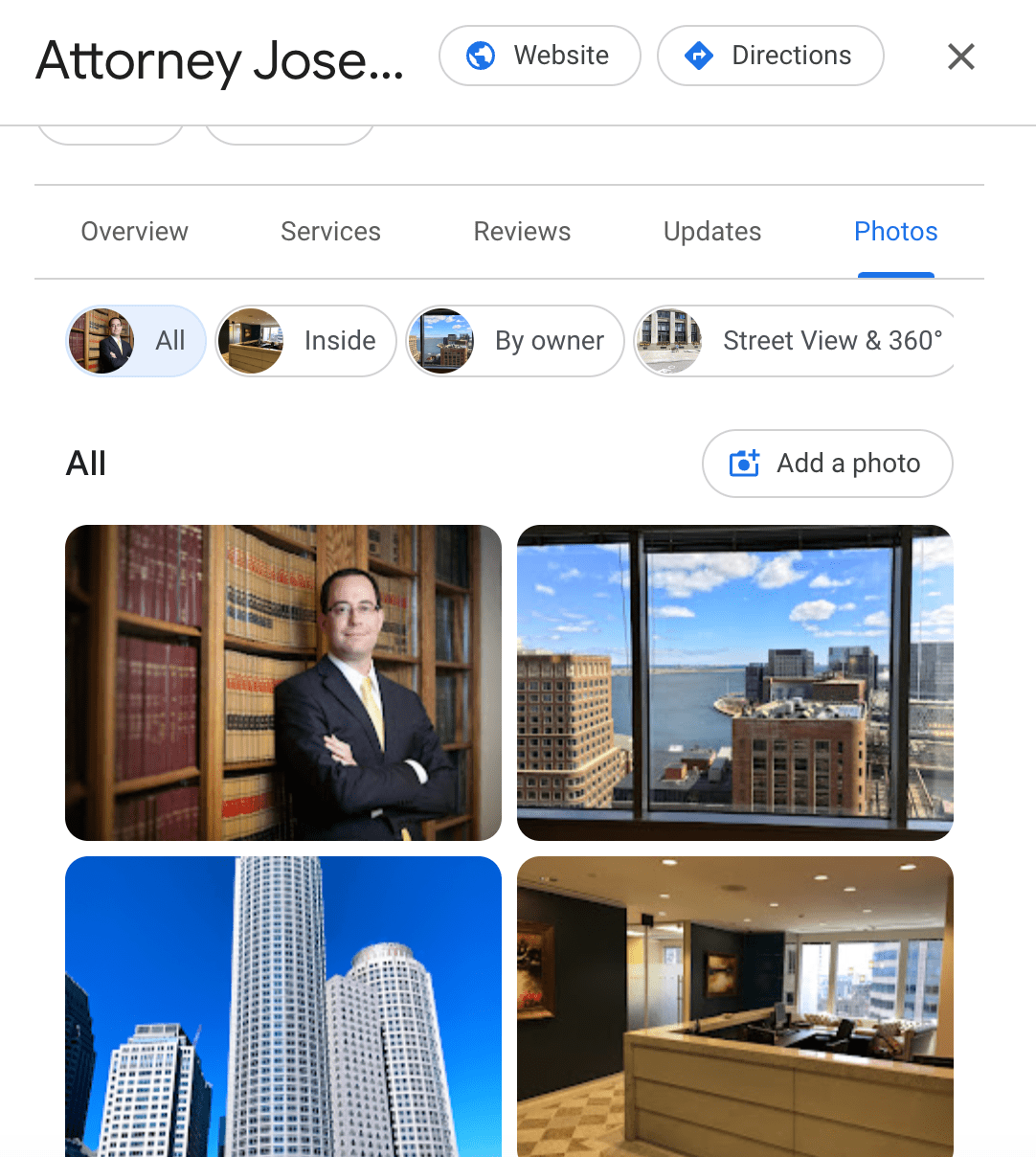
Selecting the right GBP categories is just as important as filling your profile with rich images. While “lawyer” is a good start, get more specific with your practice areas. Are you a personal injury specialist? A family law expert? A criminal defense attorney? The more precise you are, the better Google can match you with the right clients.
Your GBP description is your chance to shine. Craft a compelling narrative that highlights your firm’s strengths, experience, and areas of expertise. Keep it concise, informative, and engaging, avoiding any legalese that might confuse potential clients.
Here are some excellent examples:
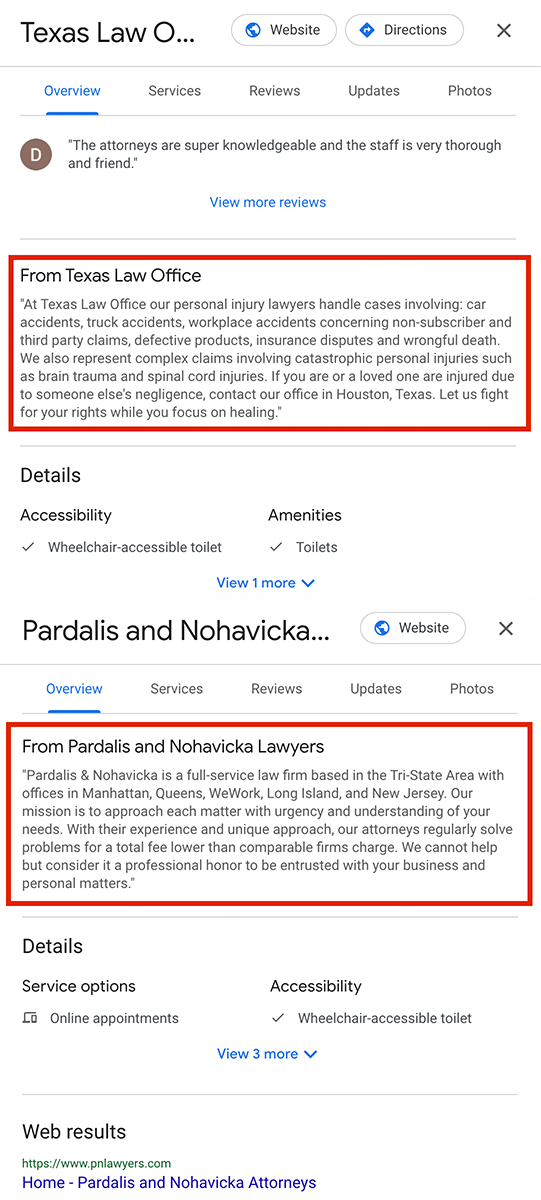
Frequently updating your GBP with fresh content is another key to success. Share news about your firm, recent case wins, legal tips, or even lighthearted posts related to your practice areas. This keeps your profile active and engaging, signaling to Google that you’re a relevant and reliable source of information.
Client reviews hold immense power in shaping your law firm’s online reputation. Potential clients often turn to online reviews to gauge a business’ credibility and quality before making a decision.
Actively encourage satisfied clients to share their positive experiences on your Google Business Profile. This is a great way to boost your firm’s visibility and foster trust with potential clients who are researching their options.
Additionally, make it a priority to respond promptly and professionally to all reviews, whether positive or negative. This demonstrates your commitment to client satisfaction and willingness to address any concerns.
Here are some great ways to go about this:
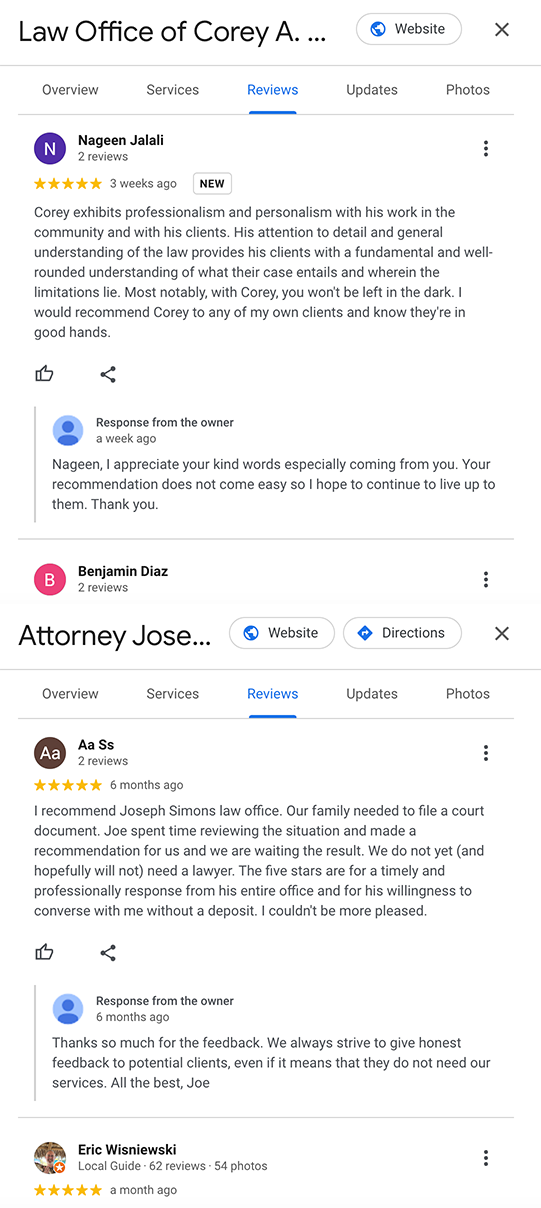
Remember, you’re targeting clients in your specific geographic area, so make it abundantly clear where you operate.
Your firm’s address should be prominently displayed on your GBP. Double-check that it’s accurate and up-to-date. You can also include your city and state in your business name as long as it accurately reflects your official name.
Incorporate location-specific keywords throughout your profile, including your business description, services offered, and posts. For example, instead of simply stating “Family Law Attorney,” you could say “Family Law Attorney Serving [Your City] and Surrounding Areas.”
Utilize the “Service Areas” section of your GBP to specify the cities or regions you serve. This helps Google understand your geographic reach and ensures your firm appears in relevant local searches.
Finally, don’t forget to mention your location in your GBP posts. Share updates about local events, legal news relevant to your area, or community initiatives your firm is involved in. This reinforces your local presence and demonstrates your commitment to the community you serve.
2. Target Local Keywords
Think of keywords as the language your potential clients use when seeking legal assistance online. These are the words and phrases they type into search engines like Google when seeking a lawyer in their area. For example, a person in Chicago seeking a personal injury attorney may search for “personal injury lawyer Chicago” or “Chicago accident lawyer.”
By identifying and strategically incorporating these local keywords into your website content, meta descriptions, title tags, and even image alt text, you send a clear signal to search engines that your firm is relevant to those local searches. This, in turn, increases the likelihood of your website appearing at the top of search results when potential clients in your area are actively seeking legal representation.
But don’t just stuff your content with keywords for the sake of it. Google’s algorithm is sophisticated enough to detect keyword stuffing, and it can actually harm your rankings. Instead, focus on creating high-quality, informative content that naturally incorporates relevant local keywords.
To identify the most relevant local keywords for your firm, conduct thorough keyword research. Use tools like Google Keyword Planner to find high-volume search terms specific to your location and practice areas. Look for keywords with a good balance of search volume and competition, and prioritize those that align with your firm’s expertise and target audience.
Once you’ve identified your target keywords, weave them seamlessly into your website content. Create blogs, articles, or landing pages that address common legal questions and concerns in your community. Optimize your page titles and meta descriptions with local keywords to entice potential clients to click on your website in search results.
Here are some of our favorite examples:
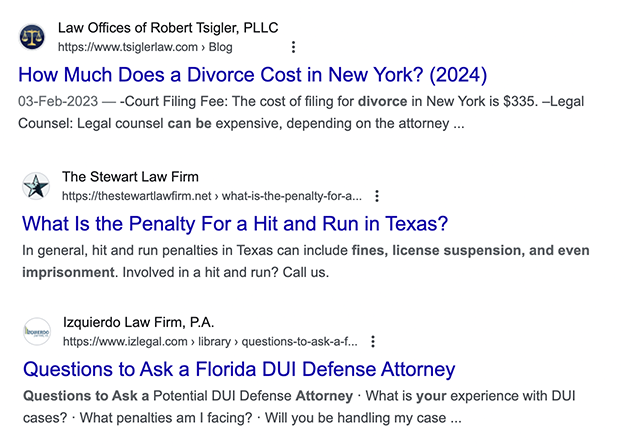
Notice how the location, whether it’s “New York,” “Texas,” or “Florida,” is mentioned in both the title and the meta description. That’s the right way to go about it.
Remember, local keyword targeting is an ongoing process. As your practice evolves and new search trends emerge, continuously refine your keyword strategy to ensure you’re always reaching the right audience at the right time.
Recommended Read: How to Do Local SEO Keyword Research: A Step-by-Step Guide
3. Build Local Citations
Think of citations as online mentions of your firm’s name, address, and phone number (NAP) scattered across various directories, websites, and platforms. These mentions act as virtual breadcrumbs, leading search engines and potential clients directly to your doorstep.
Why are local citations so important for lawyers? For starters, they bolster your firm’s credibility and trustworthiness in the eyes of search engines. When your NAP information is consistent across multiple platforms, it signals to Google that your firm is legitimate and well-established in the local community. This, in turn, improves your chances of ranking higher in local search results (and who wouldn’t want that?).
Secondly, local citations increase your firm’s visibility and reach. By listing your firm in reputable online directories and platforms, you expose your brand to a wider audience, potentially attracting clients who may not have discovered you otherwise. This expanded online presence can lead to increased website traffic, phone calls, and, ultimately, more clients.
But building citations isn’t just a matter of quantity; it’s also about quality. Focus on high-authority directories and platforms that are relevant to your practice areas and geographic location. Here are some key strategies to consider:
- Claim and Optimize Your Listings on Major Directories: Start with the big players like Google My Business, Yelp, Bing Places, and Avvo. Ensure your NAP information is accurate and consistent, add high-quality photos, and encourage clients to leave reviews.
- Target Niche Legal Directories: Explore directories specific to your practice areas, such as FindLaw, com, or Justia. These platforms cater to a legal audience, increasing the chances of attracting qualified leads.
- Leverage Local Directories: Look for online directories that focus on your city or region. These platforms often have high domain authority and can significantly boost your local search rankings.
- Explore Industry-Specific Platforms: Consider listing your firm on platforms relevant to your areas of expertise. For example, if you specialize in personal injury law, explore directories specific to that niche.
Building local citations can be a time-consuming and complex process. That’s why many law firms choose to partner with local SEO companies that specialize in local SEO services.
These experts have the knowledge and tools to efficiently build and manage your citations across various platforms. By outsourcing this task to a local SEO provider, you can free up valuable time to focus on your core legal practice while reaping all the benefits of local SEO for lawyers.
4. Creation Location-Specific Content
Your potential clients aren’t just looking for any lawyer; they’re looking for a lawyer near them. Someone who understands their city’s unique legal landscape, neighborhood, and community. By crafting content that speaks directly to their local concerns and interests, you’ll attract clicks and build trust with the people who matter most to your business.
So, what exactly does location-specific content look like? Are you supposed to slap the name of your city onto every other sentence? Not quite. The goal is to delve into topics that resonate with your local audience.
Let’s say you’re a personal injury attorney in Miami. Instead of writing a generic blog about car accident laws, you could create a piece titled “Navigating Miami’s Unique Car Accident Laws: What You Need to Know.” This targets local keywords and positions you as the go-to expert on Miami-specific legal issues.
Or perhaps you’re a family lawyer in Austin. Instead of a broad overview of child custody laws, you could write an article titled “Understanding Child Custody Laws in Austin: A Guide for Texas Parents.” This speaks directly to your local audience’s concerns. It also demonstrates your expertise in the local community’s legal nuances.
You can also create location-specific landing pages on your website that highlight your services in different neighborhoods or suburbs. You can publish local case studies that demonstrate your success in resolving legal issues specific to your area. You can even create videos featuring interviews with local experts or community leaders to further solidify your local connections.
The possibilities are endless, but the goal remains the same: to create relevant, informative, and engaging content for your local audience. By doing so, you’ll improve your search engine rankings and establish yourself as the trusted legal authority in your community.
5. Get Quality Backlinks from Local Sources
Backlinks act as votes of confidence for your law firm’s website. These are links from other websites that point back to your site, signaling to search engines that your content is valuable and trustworthy.
Let’s put it this way. If a reputable local news website or a well-respected community organization links to your website, it’s a sign that you’re a trusted resource in the local legal landscape. You’ll end up walking away with better search engine rankings and a shinier reputation among potential clients in your area.
But how do you secure these coveted local backlinks?
- Partner with Local Businesses: Collaborate with other businesses in your community to create mutually beneficial content or promotions. For example, you could co-author a blog with a local financial advisor on estate planning or offer a joint webinar with a local real estate agent on legal issues related to property transactions. This is an excellent way to generate backlinks. You’ll also end up fostering valuable relationships within your community.
- Embrace Guest Blogging: Offer to write informative guest posts for other reputable local websites or blogs. You’ll get a chance to showcase your expertise to a new audience, establish yourself as a thought leader, and earn a valuable backlink to your website. Use our insightful guide, “Guest Blogging Goldmine for Lawyers: Expand Your Reach & Reputation,” to master these critical ropes.
- Engage with Local Media: Reach out to local newspapers, online publications, or radio stations and offer your expertise on legal matters relevant to your community. If you’re interviewed or quoted in an article, you’ll likely get a valuable backlink from a high-authority local source.
- Sponsor Local Events or Organizations: Sponsoring local events or charities is a great way to give back to your community while also earning backlinks. Your firm’s logo and website link will often be featured on event websites or promotional materials, increasing your visibility and generating valuable backlinks.
- Participate in Local Forums and Online Communities: Engage in discussions on local forums or online communities related to your practice areas. Share your insights, offer helpful advice, and include a link to your website in your signature or profile. This practice will help establish you as a thought leader. The best part? You’ll also earn backlinks from relevant local sources.
- Get Listed in Local Directories: Many cities and regions have online directories that list local businesses and organizations. Ensure your law firm is listed in these directories with accurate NAP information and a link to your website. This can significantly boost your local SEO and generate valuable backlinks.
Keep in mind that building quality backlinks takes time and effort. Instead of spamming low-quality directories or buying links from dubious sources, focus on building genuine relationships with local businesses, organizations, and media outlets. Offer valuable content, participate in community events, and establish yourself as a trusted resource.
Recommended Read: Proven Link Building Tactics to Boost Your Law Firm’s SEO
If you need a hand, turn to a professional local SEO company that specializes in local link building. By partnering with a local SEO provider, you can save valuable time and resources while maximizing your chances of attracting a steady stream of local clients.
How to Master Lawyer SEO
While local SEO focuses on attracting clients in your immediate vicinity, lawyer SEO casts a wider net. The goal is to capture the attention of web users seeking specific legal services regardless of their location. How can you go about this? By optimizing your online presence to rank higher in search results for broader legal keywords like “personal injury lawyer,” “divorce attorney,” “bankruptcy lawyer,” and so on.
Think of lawyer SEO as your firm’s digital megaphone. You get a chance to broadcast your expertise to a national or even global audience. By targeting these broader keywords, you attract clients who are actively searching for legal representation in your specific practice areas, even if they’re not located in your city or state.
Why on earth would you do that? Why target potential clients who fall outside your service areas? Well, here’s the kicker: even if you can’t directly represent them due to geographical limitations, you can still leverage their interest.
Let’s say a web user in another state stumbles upon your well-crafted article on complex litigation strategies. Impressed by your knowledge and insights, they may reach out to you for a consultation or referral to a colleague in their area. This translates to potential revenue generation and expands your professional network.
Lawyer SEO can also help establish your firm as a thought leader in your field. By consistently producing high-quality, informative content that ranks well for relevant keywords, you position yourself as an authority figure, attracting attention from potential clients, colleagues, and even media outlets. This can result in speaking engagements, publications, and other opportunities to elevate your brand and expand your reach.
A robust lawyer SEO strategy can also complement your local SEO efforts. By building a strong online presence and demonstrating expertise in your practice areas, you can enhance your firm’s overall credibility and trustworthiness, both locally and nationally. This can have a positive ripple effect on your local search rankings, making you an even more attractive option for potential clients in your area.
Are you with us? Excellent! Let’s delve into the intricacies of lawyer SEO and provide actionable strategies to help you master this essential aspect of online marketing.
1. Find and Use Lawyer-Friendly Keywords
Mastering the art of keyword selection is paramount. Think of it as choosing the right bait to lure the perfect fish; the right keywords will attract the clients you want, while the wrong ones will leave you empty-handed.
Lawyer-friendly keywords are those that reflect the specific legal services you offer and the types of cases you handle. They’re the phrases potential clients type into search engines when seeking legal representation. These keywords can range from broad terms like “personal injury lawyer” or “family law attorney” to more specific phrases like “DUI defense lawyer” or “child custody attorney.”
Identifying the right keywords is essential for attracting the right audience. Let’s say you specialize in intellectual property law, but your website is optimized for general legal terms. Sure, you may attract traffic, but it won’t be the right kind of traffic. Potential clients looking for IP expertise might not find you, and those who do may not be a good fit for your services.
How do you find those perfect lawyer-friendly keywords? Start by brainstorming a list of terms and phrases that accurately describe your practice areas and the types of cases you handle. Think about the questions potential clients may ask when searching for a lawyer online. For example, if you specialize in criminal defense, keywords like “criminal defense attorney,” “DUI defense lawyer,” or “white-collar crime lawyer” may be relevant.
Once you have a list of potential keywords, use Google Keyword Planner to assess their search volume and competition. Look for keywords with a decent search volume and moderate competition, as these offer the best opportunity to rank high in search results.
Another effective strategy is to analyze your competitors’ websites and identify the keywords they are targeting. This can give you valuable insights into the terms and phrases that are driving traffic to their sites.
Once you’ve identified your target keywords, it’s time to incorporate them strategically into your website content. Use them in your page titles, meta descriptions, header tags, and body copy. However, be careful not to overuse keywords or engage in keyword stuffing, as this can negatively impact your search engine rankings. Instead, aim for a natural and organic use of keywords that flows seamlessly within your content.
Here are a few smart ways to go about this:
- Instead of saying, “We help clients with their legal issues,” say, “Our experienced attorneys specialize in personal injury law. We help clients navigate complex legal issues and obtain fair compensation for their injuries.”
- Instead of saying, “We offer a variety of legal services,” say, “Our law firm provides comprehensive legal representation in areas like family law, estate planning, and business law.”
- Instead of saying, “Contact us today for a consultation,” say, “Schedule a free consultation with our experienced DUI defense lawyer to discuss your case and explore your legal options.”
See what we mean? By making this simple switch and incorporating targeted, lawyer-friendly keywords, you’ll attract qualified leads who are actively seeking your expertise. This targeted approach will improve your search engine rankings and establish your firm as a credible authority in your practice areas. The outcome? More clients and a thriving practice.
2. Create High-Quality Content Around Law
Content is king; there’s no denying it. But not just any content. To truly elevate your law firm’s online presence and attract a steady stream of qualified leads, you need to create high-quality content that resonates with your target audience: people who are quite simply looking for a lawyer.
Think of your website as your firm’s virtual brochure. It’s the first impression potential clients will have of your expertise and professionalism. By producing informative, engaging, and relevant content, you’ll showcase your knowledge and build trust with your audience.
But what exactly constitutes “high-quality” content in the legal field? Should you just regurgitate legal jargon and summarize case law? Not really. High-quality content provides valuable insights, actionable advice, and clear explanations that address your potential clients’ specific needs and concerns.
For example, if you specialize in personal injury law, consider creating blogs that delve into common questions and concerns surrounding car accidents, slip and falls, or medical malpractice. Offer practical tips on what to do after an accident, explain the legal process in layman’s terms, and provide resources for seeking compensation.
Let’s look at this in action. Rosenbaum Personal Injury Lawyers ranks number one for the keyword “personal injury law NYC.” And for good reason. If you look through their blog, you’ll find meticulous categories, each dedicated to specific areas of personal injury law. They offer comprehensive guides on car accidents, child injuries, defective medical devices, injuries, negligence, and more.
Here’s a quick look:
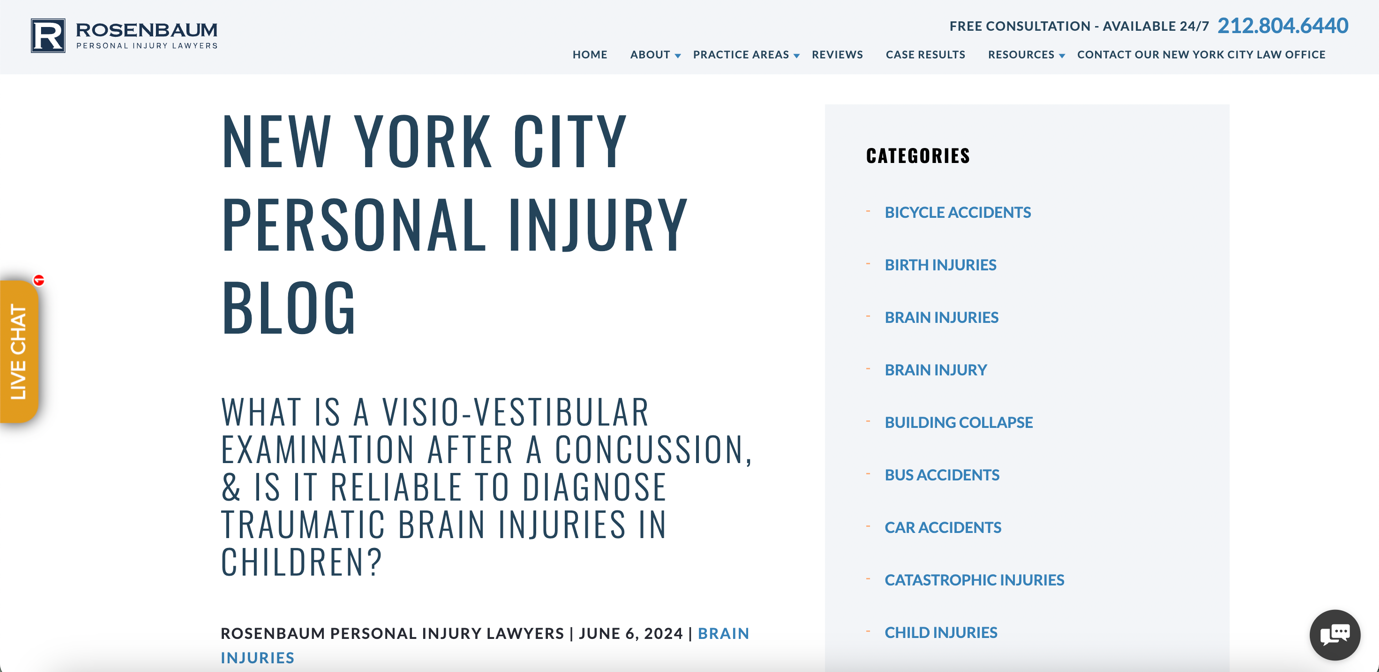
This organized approach makes it easier for users to find relevant information and signals to search engines that Rosenbaum Personal Injury Lawyers is a comprehensive resource for personal injury law in NYC. By categorizing their content, they’ve created a structured information hub that caters to both their target audience and search engine algorithms.
Each category is filled with in-depth blogs that address common questions and concerns potential clients may have. If you haven’t already, follow suit. If your firm focuses on family law, you could create content that addresses common issues like divorce, child custody, or spousal support. Offer guidance on navigating the emotional and legal complexities of these situations, provide tips for co-parenting effectively, and explain the legal rights and responsibilities of each party.
Keep in mind that your content should always be tailored to your target audience. Consider the demographics, interests, and pain points of your ideal clients. What are their most pressing legal concerns? What kind of information would they find most helpful? By answering these questions, you can create content that speaks directly to their needs and positions you as the solution to their problems.
To maximize the impact of your content, incorporate a variety of formats. In addition to written blogs, consider creating videos, infographics, or podcasts that explore legal topics in an engaging and accessible way. This can help you reach a wider audience and cater to different learning styles.
Stay up-to-date with the latest legal developments, industry trends, and client needs. Continuously update and expand your content library to maintain relevance and ensure you’re always providing the most valuable information to your audience. By investing in high-quality content, you’ll build a reputation as a trusted legal resource, attract more clients, and grow your practice.
3. Optimize for Featured Snippets
Featured snippets are the holy grail of search engine results. They appear in the coveted “position zero” above the traditional organic listings.
These concise summaries of information are pulled directly from web pages and displayed prominently on Google’s search results page, offering a prime opportunity for your law firm to capture attention and drive traffic.
Featured snippets are especially valuable for lawyers. Why? Because legal queries often involve complex questions with nuanced answers. By securing a featured snippet, you instantly position your firm as a trusted source of legal information, even before users click on your website.
Want to optimize your content for featured snippets and increase your chances of securing this coveted spot?
This should be your game plan:
- Identify Target Questions: Conduct thorough research to identify the questions your target audience is asking about your practice areas. Use tools like AnswerThePublic or simply browse relevant forums and Q&A platforms to gain insights into the queries people are typing into search engines.
- Structure Your Content for Featured Snippets: Format your content in a way that makes it easy for search engines to extract and display it as a featured snippet. This could involve using clear headings and subheadings, concise paragraphs, or bulleted lists to present information in a structured format.
- Answer Questions Concisely: When answering questions in your content, be direct and to the point. Aim to provide the most relevant information in the fewest possible words. Remember, featured snippets are typically short and concise.
- Use Tables and Lists: If applicable, utilize tables or lists to present information in a structured and visually appealing format. This way, your content is more likely to be selected for featured snippets, especially for queries that involve comparisons or multiple data points.
- Optimize for Voice Search: With the rise of voice assistants like Siri and Alexa, optimizing your content for voice search is becoming increasingly important. Consider how people might phrase their questions verbally and tailor your content accordingly.
While featured snippets offer a golden opportunity for lawyers to shine in search results, there are a few common mistakes to avoid. First and foremost, resist the urge to stuff your content with keywords in an attempt to game the system. Google’s algorithm is sophisticated enough to detect keyword stuffing. Instead, focus on creating natural, informative content that genuinely answers users’ questions.
Another critical mistake is providing outdated or inaccurate information. Featured snippets are meant to provide the most relevant and up-to-date answers to users’ queries. Frequently review and update your content to ensure it reflects the latest legal developments and accurately addresses your target audience’s needs.
4. Build a Strong Internal Linking Structure
In the intricate architecture of your law firm’s website, internal links are the hidden pathways that guide both users and search engines through your content. Think of them as the hallways and stairwells that connect the different rooms of your digital office to ensure smooth navigation and seamless access to information.
Internal links play a critical role in lawyer SEO. By strategically linking relevant pages within your website, you create a web of interconnected content that helps search engines understand the hierarchy and relationship between your pages. This, in turn, improves your website’s crawlability and indexability, making it easier for search engines to find and rank your content.
Let’s say you have a blog on “Understanding the Basics of Personal Injury Law.” Within that post, you could include links to other relevant pages on your website, e.g., your personal injury practice area page, a case study showcasing a successful personal injury claim, or a free consultation landing page. This will provide additional value to the reader and help search engines understand the context and relevance of your content.
Internal linking also helps distribute link equity throughout your website. When a page on your site receives a backlink from another website, it gains authority in the eyes of search engines. By internally linking that page to other relevant pages on your site, you pass some of that authority along, boosting the overall SEO of your website.
To build a strong internal linking structure, start by creating a logical hierarchy for your web content. Identify the most important pages, e.g., your practice area pages, and link to them from your homepage and other relevant pages. Use descriptive anchor text that accurately describes the linked page, making it easier for both users and search engines to understand the context of the link.
Feel free to link deep within your website. Instead of just linking to your main practice area pages, link to specific blogs, case studies, or FAQs that provide detailed information on specific legal topics. This is an excellent way to help users find the information they need quickly and easily. You’ll also send up boasting the depth and breadth of your expertise to search engines.
Internal linking isn’t a one-time task. As you add new content to your website, make sure you incorporate relevant internal links to maintain a strong and interconnected structure. By investing time and effort into building a robust internal linking structure, you’ll create a user-friendly website that’s both informative and optimized for search engines.
If you need help with internal linking, don’t hesitate to consult experts who specialize in lawyer SEO. They’ll take the reins, rework your internal link structure, and give your site a hefty boost in credibility, reputation, and trustworthiness.
5. Utilize Schema Markup for Lawyers
Think of schema markup as a secret language that communicates directly with search engines, providing them with additional context and information about your law firm. This structured data helps search engines better understand your website’s content, resulting in richer search results and increased visibility for your firm.
For lawyers, utilizing schema markup can be a game-changer. By implementing a lawyer-specific schema, you can provide search engines with detailed information about your practice areas, legal services, client reviews, contact details, and more. This is a great way to increase your chances of appearing in relevant search results. You’ll also end up enhancing the appearance of your listings with rich snippets, e.g., star ratings, review counts, and other eye-catching elements.
For instance, when a potential client searches for a “personal injury lawyer,” schema markup can help your firm’s listing stand out by displaying your average star rating, number of reviews, and even a brief excerpt from a positive client testimonial. You’ll attract the right attention and instill much-needed confidence in potential clients, encouraging them to click on your website and explore your services.
This is what we’re talking about:

Schema markup can also help you gain a competitive edge in local search results. By marking up your firm’s address, phone number, and hours of operation, you can ensure this information is displayed prominently in local search results, making it easier for potential clients to find and contact you.
While the benefits of schema markup are undeniable, the technical implementation can be daunting for those without coding experience. That’s where partnering with a company specializing in lawyer SEO can prove invaluable.
These experts possess in-depth knowledge of schema markup and its various applications for law firms. They can assess your website’s existing structure, identify opportunities for optimization, and implement the appropriate schema types to enhance your search engine visibility. Whether it’s marking up your attorney profiles, legal services, client testimonials, or FAQs, a specialist can ensure your schema markup is accurate and comprehensive.
[blog_form6]
It’s Time to Master Both Local SEO and Lawyer SEO
By now, it’s clear that both local SEO and lawyer SEO are indispensable tools for any law firm that wants to stand out online. Ignoring either one is like showing up to court with only half your case prepared; you may win some battles, but you won’t dominate the legal jungle.
But let’s face it, mastering both local SEO and lawyer SEO can be tricky, especially for busy attorneys who are already juggling a demanding workload. That’s where Search Berg comes in. Our experts can help you develop and implement a comprehensive SEO strategy that maximizes your visibility both locally and nationally.
Whether you’re looking for affordable local SEO services to boost your local rankings or a comprehensive lawyer SEO campaign to attract clients from across the country, Search Berg has the expertise and experience to help you achieve your goals.
Why settle for mediocrity when you can tap into Google’s top search results? Explore our local SEO services and lawyer SEO services to get started. Potential clients are waiting… let Search Berg turn them into cases won!
Stop Playing Hide-and-Seek with Potential Clients
Your legal expertise is too valuable to be buried in the depths of Google’s search results. It’s time to ditch the invisibility cloak and step into the spotlight.
Search Berg’s lawyer SEO wizards are ready to work their magic. We’ll craft a customized strategy that showcases your legal prowess, attracts high-value clients, and transforms your firm into an online powerhouse.
It all starts with a free consultation!
No spam, just expert advice!














